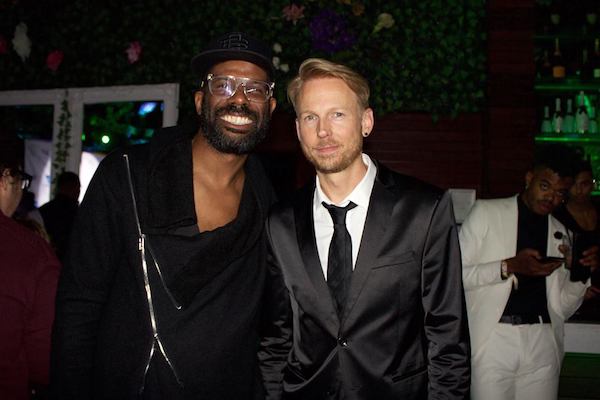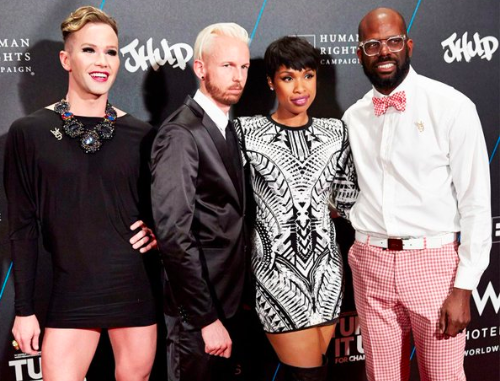
Christopher Street West has contracted with Craig Bowers, a former CSW board member and the long-time business partner of CSW Chairman Chris Classen, to raise money for the non-profit organization’s annual L.A. Pride parade and festival.
Bowers’s three-year contract guarantees him a commission of 20% of all sponsorship revenue for the annual event, which this year takes place on June 9 and 10 in West Hollywood. That part-time work is likely to be lucrative for Bowers. For example, CSW’s 2016 federal tax return showed it received $827,710 in “gifts, grants, contributions,” which come from sponsorships solicited from local firms and national companies such as Delta Airlines and Budweiser. That would have meant a payment of $165,000 to Bowers for his work soliciting sponsors for the 2016 weekend Pride festival and parade.
CSW’s contract with Bowers raises new questions about the ethics of an organization that long has been tainted by complaints about its poor management and allegations of improper behavior by members of its board.
The contract with Bowers also means it could face legal issues. One concern is that Bowers has been named one of 12 members of CSW’s board emeritus, which CSW describes as “a lifetime advisory position.” Another is that Bowers and Classen remain partners in Incluence, a marketing and event firm. State law bars “self-dealing” transactions, which are described as those in which one of more of a non-profit’s directors has a material financial interest. It is not clear whether the state Department of Justice would consider the emeritus advisory position a conflict of interest, although business partnership would appear to make the contract with Bowers a violation of state law.
In an interview with WEHOville, Classen admitted that he and Bowers remain partners in Incluence, which is listed as CSW’s exclusive sponsorship solicitation contractor. Classen said he didn’t know whether that partnership might put CSW in violation of state law. “I’m not a non-profit attorney,” he said. Classen also said that Incluence has been relatively inactive since he and Bowers joined the CSW board of directors in 2015.

Another issue is that Bowers appears not to be registered with the California Attorney General’s Registry of Charitable Trusts, which all charities and those raising money for non-profit organizations must do. The registry’s website allows one to search for the federal tax filings of non-profits in California and for the registrations of those who are paid to do fundraising.
In any case, commission payments for charity fundraising are in violation of the standards of both the Association of Fundraising Professionals and the Council of NonProfits. The Council of Nonprofits is an organization of more than 25,000 nonprofit groups around the country that advocates for and sets standards for such groups.
On its website, the Association of Fundraising Professionals says that it “believes that individuals serving a charity for compensation must accept the principle that charitable purpose, not self-gain, is paramount. If this principle is violated and percentage-based compensation is accepted charitable mission can become secondary to self-gain; donor trust can be unalterably damaged; there is incentive for self-dealing to prevail over donors’ best interests. In addition, percentage-based compensation, however administered, can produce reward without merit.”
In its argument against commission-based payments, AFP says “Contributions that materialize at a given moment are often the culmination of the efforts of many people, including volunteers, over long periods of time. The person whose compensation rests on a percentage of contributions raised would wish to include such gifts for the purposes of calculation his/her compensation. For example: Charities receive unexpected or unsolicited gifts, often bequests, sometimes from previously unknown benefactors. Such windfall gifts can provide an unrealistically high base–in effect, an unearned base–on which percentage-based compensation may be calculated.”
The Council of Nonprofits also says that “It is NOT appropriate for a nonprofit to compensate a fundraising professional based on a percentage of the money raised.”
CSW has had financial, community relations and ethical issues for decades. In 2016, it lost nearly $400,000 on the June Pride events after Classen and Bowers turned the annual Pride festival into a music festival that some labeled “the gay Coachella.” That decision came with a large increase in ticket prices and a reduction in programming for lesbians and transgender people, some of which was reversed when members of the community protested and threatened a boycott. Classen has noted that the massacre of gay people at the Pulse nightclub in Orlando, Fla., shortly before Pride and the arrest in Santa Monica of a man with bomb ingredients and weapons who said he was headed to WeHo likely was responsible for the drop in festival attendance and beverage sale revenue.
Another issue was Classen’s demand that members of CSW’s board of directors sign nondisclosure agreements that some described as onerous. That requirement came after WEHOville published details about the financial losses of the 2016 event, which had not yet been disclosed to the board members. Five members of CSW’s 15-member board of directors resigned rather than sign the nondisclosure agreement.
Other issues under the leadership of former board chairman Rodney Scott included the then-financial director making an unapproved loan to himself and the organization’s habit of exaggerating attendance figures and refusing to make its tax returns easily available. In a September 2000 story, L.A. Weekly revealed CSW’s reimbursement for lavish spending by board members on travel and entertainment .
CSW recently announced the appointment of Madonna Cacciatore as its first full-time executive director, a move that some hope will result in major changes in the organization, which celebrates its 50th anniversary in 2020. Cacciatore will take office on July 1.
In recent months CSW also has added eight new board members. Among them are Brian Rosman, head of the Dog and A Duck, a locally prominent public relations and marketing agency; Alexandra Magallon of the TransLatin@ Coalition; Gerald Garth of the AMAAD Institute, and Estevan Montemayor, communications director for L.A. City Councilmember David Ryu.
